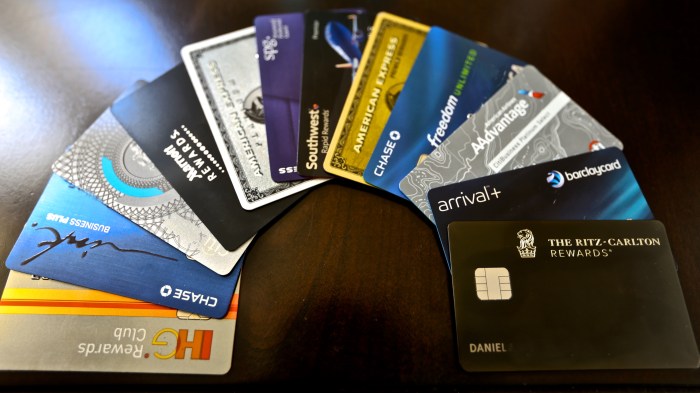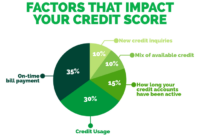How to choose a credit card? This essential decision can significantly impact your financial well-being. Let’s delve into the key factors to consider when selecting the right credit card for your needs.
Understand Your Spending Habits: How To Choose A Credit Card
Assessing your spending patterns before choosing a credit card is crucial to ensure that you select the most suitable option that aligns with your financial habits and goals. By understanding how you typically spend money, you can make an informed decision that maximizes the benefits of using a credit card.
Types of Spending Habits
- Regular Expenses: If you have consistent monthly expenses such as groceries, utilities, and gas, a credit card with cashback rewards on these categories can help you save money over time.
- Travel Enthusiast: For those who frequently travel, a credit card with travel rewards, airline miles, or hotel discounts may provide more value and perks.
- Luxury Shopper: If you enjoy shopping for high-end items, a credit card with exclusive shopping discounts, luxury brand rewards, or concierge services could be beneficial.
- Social Spender: Individuals who often dine out, attend events, or socialize with friends may benefit from a credit card that offers rewards on dining, entertainment, or social activities.
Benefits of Knowing Your Spending Habits
- Maximize Rewards: Understanding your spending habits allows you to select a credit card that offers rewards or cashback on categories where you spend the most, helping you maximize your benefits.
- Avoid Unnecessary Fees: By choosing a credit card that aligns with your spending patterns, you can minimize the risk of incurring fees for transactions or services that do not add value to your financial goals.
- Personalized Financial Strategy: Tailoring your credit card choice to your spending habits enables you to create a personalized financial strategy that optimizes your rewards, savings, and overall financial well-being.
Compare Interest Rates and Fees
When choosing a credit card, it is essential to compare interest rates and fees to ensure you are making a wise financial decision. Understanding these factors can help you avoid unnecessary costs and manage your finances effectively.
Types of Fees Associated with Credit Cards
- Annual Fees: Some credit cards come with an annual fee that you need to pay each year for the privilege of using the card.
- Interest Charges: If you carry a balance on your credit card, you will incur interest charges on the outstanding amount.
- Late Payment Fees: Missing your credit card payment deadline can result in late payment fees, adding to your overall debt.
- Foreign Transaction Fees: Using your credit card for purchases in a foreign currency may incur additional fees.
- Cash Advance Fees: When you withdraw cash from your credit card, you may face cash advance fees and higher interest rates.
Strategies for Choosing a Card with Favorable Rates and Minimal Fees
- Compare Interest Rates: Look for credit cards with low-interest rates, especially if you plan to carry a balance. Avoid high APRs that can significantly increase your debt over time.
- Consider Fee Structures: Choose a credit card with minimal fees, such as no annual fees or low late payment fees. Be aware of all potential charges and factor them into your decision.
- Read the Fine Print: Take the time to read the terms and conditions of the credit card to understand all fees and charges associated with it. Look for any hidden fees that could impact your finances.
- Utilize Introductory Offers: Some credit cards offer introductory periods with 0% APR on purchases or balance transfers. Take advantage of these offers to save on interest charges.
Evaluate Rewards and Benefits

When choosing a credit card, it is essential to evaluate the rewards and benefits offered by different cards. These perks can provide significant value and enhance your overall experience with the card.
Browse the multiple elements of Swing trading forex strategies to gain a more broad understanding.
Types of Rewards Programs
- Cashback: Some credit cards offer a percentage of your purchases back as cash rewards. This can help you save money on everyday expenses.
- Travel Points: Cards with travel rewards allow you to earn points that can be redeemed for flights, hotel stays, rental cars, and more. Perfect for frequent travelers.
- Discounts: Certain credit cards provide discounts or special offers on specific purchases or at partner merchants, helping you save money on shopping or dining.
Aligning Rewards with Lifestyle
It’s crucial to choose a credit card that aligns with your lifestyle to maximize the benefits you receive. For example, if you travel frequently, a card with travel rewards would be more beneficial than one offering cashback on groceries.
Consider Your Credit Score
When choosing a credit card, it is crucial to consider your credit score. Your credit score plays a significant role in the credit card application process as it reflects your creditworthiness to lenders. It is essential to understand how different credit scores can impact the type of cards available to you and the terms and conditions associated with them.
Role of Credit Scores
Your credit score is a three-digit number that ranges from 300 to 850 and is calculated based on your credit history, including factors such as payment history, credit utilization, length of credit history, new credit accounts, and credit mix. Lenders use this score to assess the risk of lending money to you. A higher credit score signifies good credit management and increases your chances of approval for credit cards with better terms and rewards.
Types of Cards Based on Credit Score
– Excellent Credit (750 and above): Individuals with excellent credit scores have access to premium credit cards with low-interest rates, high credit limits, and lucrative rewards and benefits.
– Good Credit (700-749): Those with good credit scores can qualify for a wide range of credit cards with competitive interest rates, rewards, and benefits.
– Fair Credit (650-699): Individuals with fair credit scores may have limited options for credit cards with higher interest rates and fewer rewards.
– Poor Credit (below 650): Those with poor credit scores may need to consider secured credit cards or credit-building cards to improve their creditworthiness over time.
Tips for Selecting a Credit Card Based on Credit Score
1. Know Your Credit Score: Check your credit score before applying for a credit card to understand which category you fall into.
2. Choose Wisely: Select a credit card that aligns with your credit score to increase your chances of approval and access better terms and rewards.
3. Improve Your Credit: If your credit score is not where you want it to be, focus on improving it by making timely payments, reducing debt, and avoiding new credit applications.
4. Consider Specialized Cards: Explore credit cards specifically designed for individuals with varying credit scores, such as secured cards for those with poor credit or rewards cards for those with excellent credit.
Review Cardholder Protections

When choosing a credit card, it is crucial to consider the cardholder protections and benefits offered by different issuers. These protections can provide you with added security and peace of mind in various situations, making them an essential factor to evaluate before making a decision.
Examples of Cardholder Protections
- Fraud Liability Coverage: Many credit cards offer protection against unauthorized transactions, limiting your liability in case of fraudulent activity on your account.
- Purchase Protection: Some credit cards provide coverage for damaged or stolen purchases made with the card, offering reimbursement or replacement for eligible items.
- Extended Warranty: Certain cards extend the manufacturer’s warranty on purchases, giving you additional coverage beyond the standard warranty period.
Influence on Decision-Making, How to choose a credit card
Cardholder protections can significantly impact your decision when choosing a credit card. By opting for a card with robust protections, you can safeguard yourself against potential risks and financial losses. Understanding the specific benefits and coverage offered by different cards allows you to select the one that best aligns with your needs and provides you with the necessary security in various transactions.
Explore Sign-Up Bonuses and Incentives
When choosing a credit card, one important factor to consider is the sign-up bonuses and incentives offered by credit card companies. These bonuses are rewards given to new cardholders upon meeting certain spending requirements within a specified time frame.
Concept of Sign-Up Bonuses
Sign-up bonuses can come in various forms, such as cash back, travel points, or statement credits. These incentives are designed to attract new customers and provide added value to cardholders. For example, a credit card may offer a sign-up bonus of $200 cash back after spending $500 in the first three months of account opening.
Attractive Sign-Up Bonuses
Some credit cards offer highly attractive sign-up bonuses that can significantly enhance the cardholder’s rewards. For instance, a travel rewards card may offer 50,000 bonus points after spending $3,000 in the first three months, which could be equivalent to $500 or more in travel rewards.
Leveraging Sign-Up Bonuses
To make the most of sign-up bonuses, consider your spending habits and choose a card that aligns with your regular purchases. Additionally, be mindful of the required spending threshold to earn the bonus and ensure it fits within your budget. It’s important to pay off your balance in full each month to avoid interest charges that could negate the value of the sign-up bonus.
In conclusion, selecting the right credit card requires careful consideration of your spending habits, interest rates, rewards, credit score, cardholder protections, and sign-up bonuses. By understanding these factors, you can make an informed decision that aligns with your financial goals.



